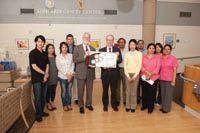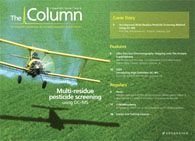Medical centre joins innovation programme
Waters has added the metabolomics programme at Georgetown University Medical Centre to its Centers of Innovation programme.

Waters has added the metabolomics programme at Georgetown University Medical Centre to its Centers of Innovation programme. The programme supports scientists making breakthroughs in health and life science research, food safety, environmental protection and sports medicine.
“Professor Fornace and his laboratory have made important and highly-cited contributions to the understanding of key signalling events in cancer. His research in disease metabonomes and biomarker research is state of the art,” said Tim Riley, the director of the programme.
“The field of metabolomics has really taken off in the last six years or so,” said Professor Fornace, Professor of Biochemistry and Molecular and Cellular Biology at the centre. “It’s a demanding area of science, and since quadrupole time-of-flight mass spectrometry came on line, there has been an exponential increase in interest in metabolomics and the number of publications in this field. We are very pleased Waters has taken an interest in our research.”
Metabolomics data generated by the laboratory’s ACQUITY UPLC and Xevo G2 QTof LC–MS systems will contribute to the Georgetown Database of Cancer, a project that has compiled metabolomics data and other information from 4000 breast cancer patients to better predict the response to various cancer therapies based on patient’s genetic profiles.
For more information about the programme visit www.waters.com/waters/nav.htm?cid=10176245 and for more about Georgetown Lombardi Comprehensive Cancer Center visit lombardi.georgetown.edu
This story originally appeared in The Column. Click here to view that issue.
New TRC Facility Accelerates Innovation and Delivery
April 25th 2025We’ve expanded our capabilities with a state-of-the-art, 200,000 sq ft TRC facility in Toronto, completed in 2024 and staffed by over 100 PhD- and MSc-level scientists. This investment enables the development of more innovative compounds, a broader catalogue and custom offering, and streamlined operations for faster delivery. • Our extensive range of over 100,000 high-quality research chemicals—including APIs, metabolites, and impurities in both native and stable isotope-labelled forms—provides essential tools for uncovering molecular disease mechanisms and exploring new opportunities for therapeutic intervention.
New Guide: Characterising Impurity Standards – What Defines “Good Enough?”
April 25th 2025Impurity reference standards (IRSs) are essential for accurately identifying and quantifying impurities in pharmaceutical development and manufacturing. Yet, with limited regulatory guidance on how much characterisation is truly required for different applications, selecting the right standard can be challenging. To help, LGC has developed a new interactive multimedia guide, packed with expert insights to support your decision-making and give you greater confidence when choosing the right IRS for your specific needs.

.png&w=3840&q=75)

.png&w=3840&q=75)



.png&w=3840&q=75)



.png&w=3840&q=75)










